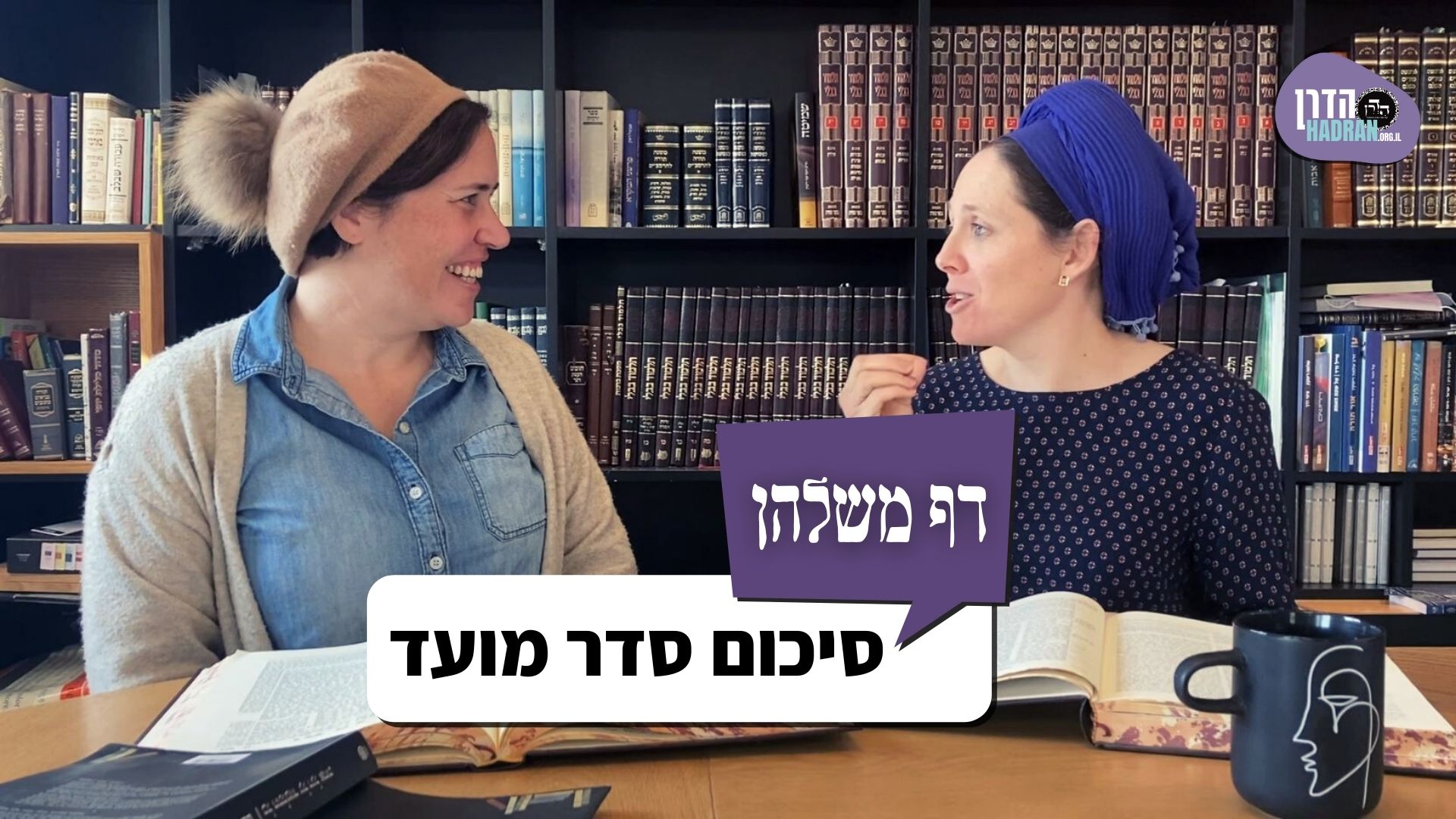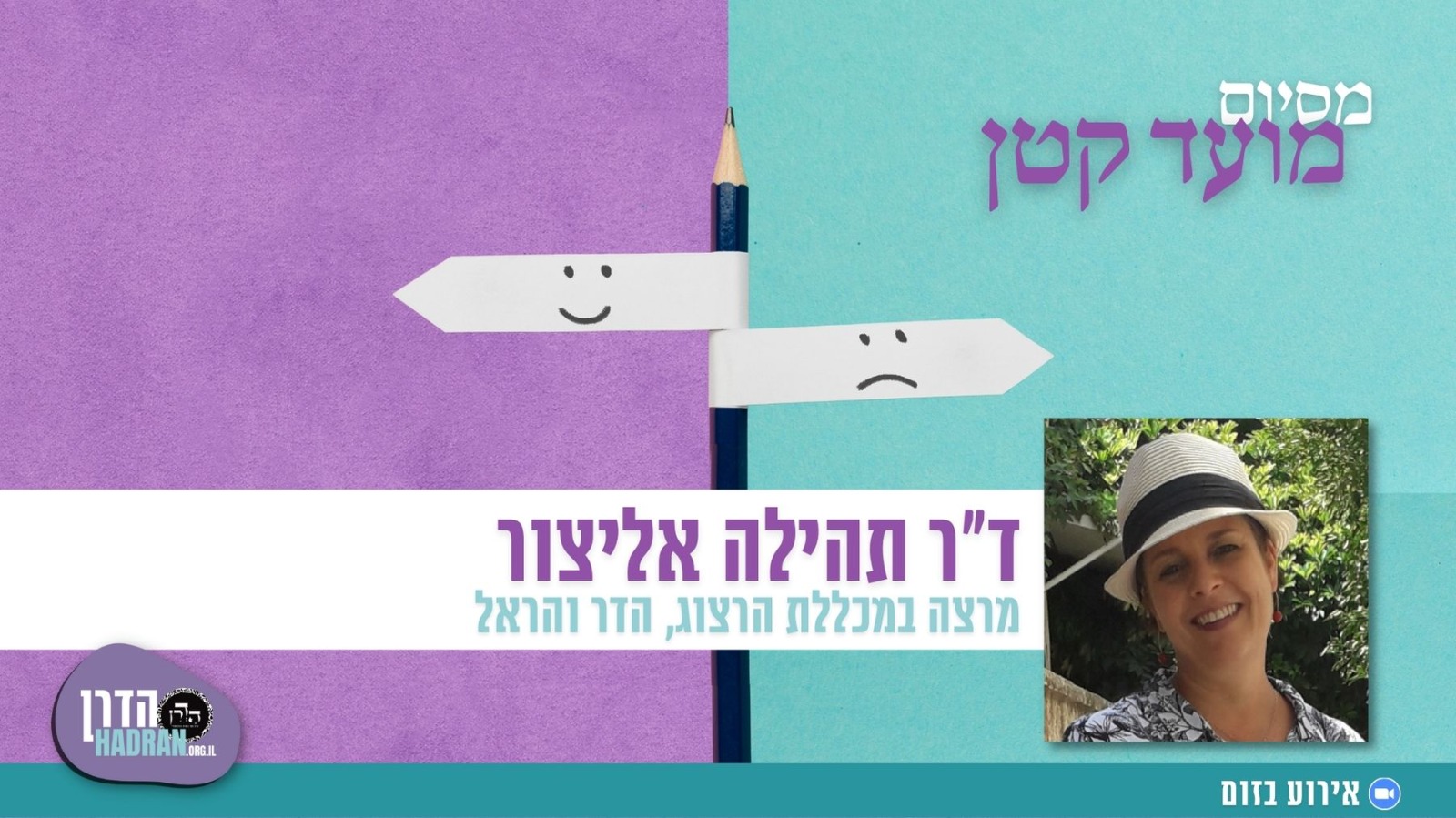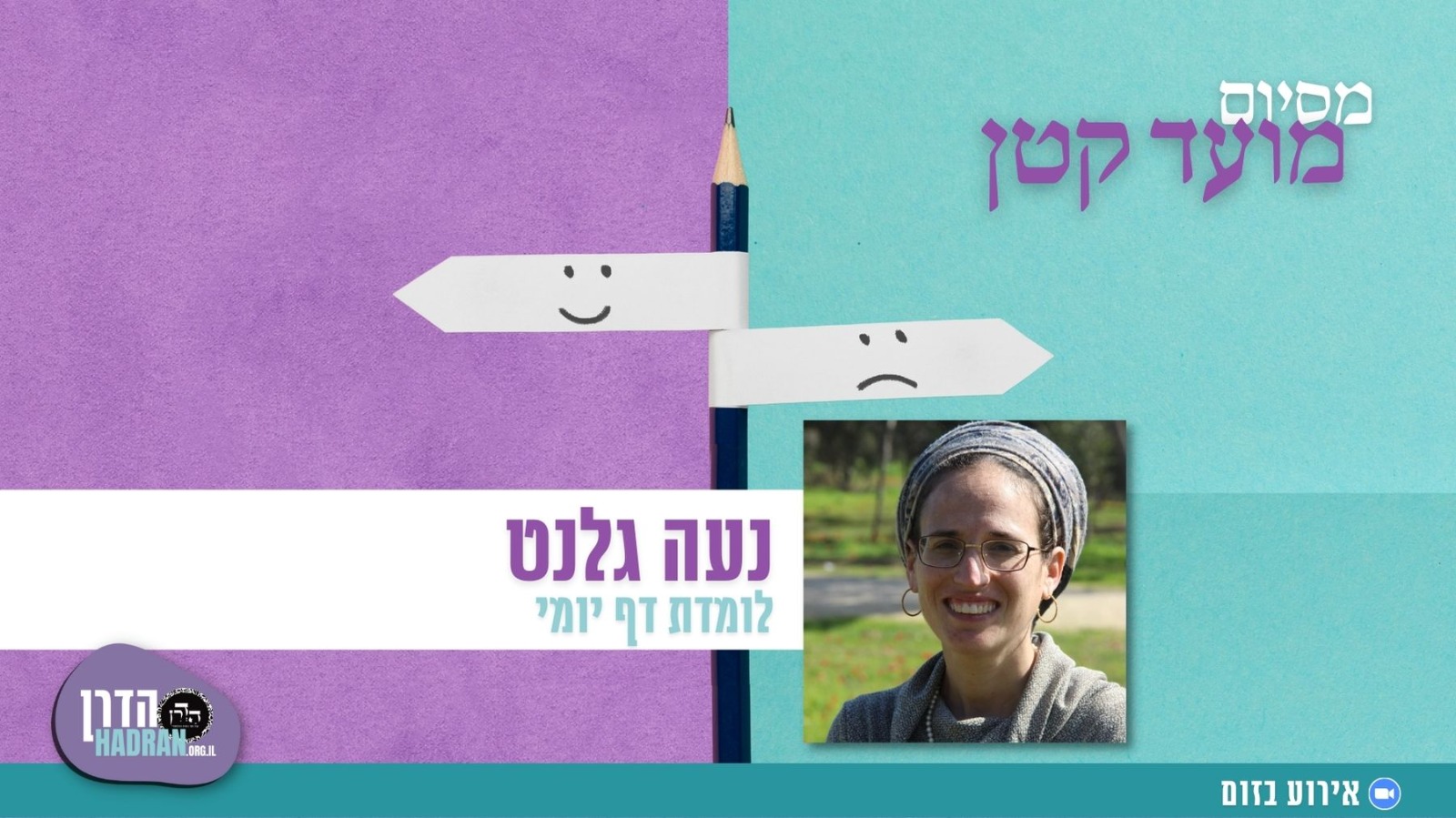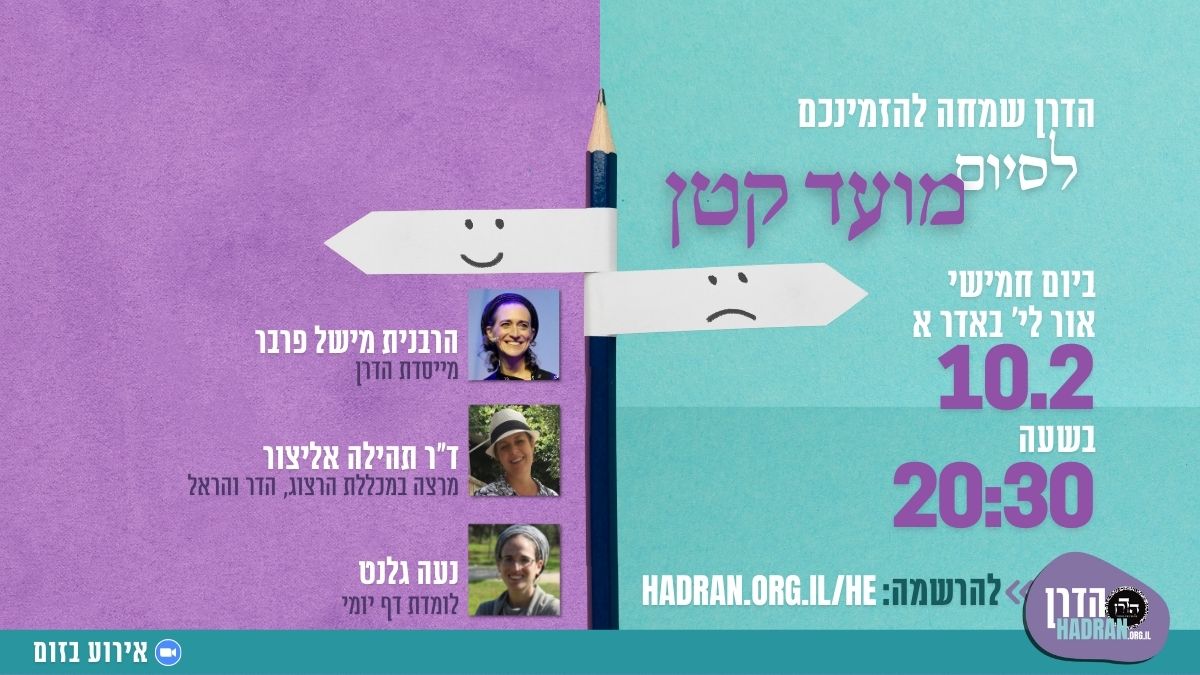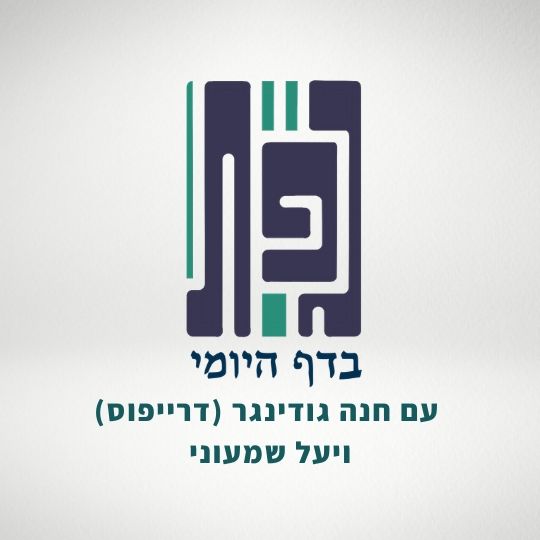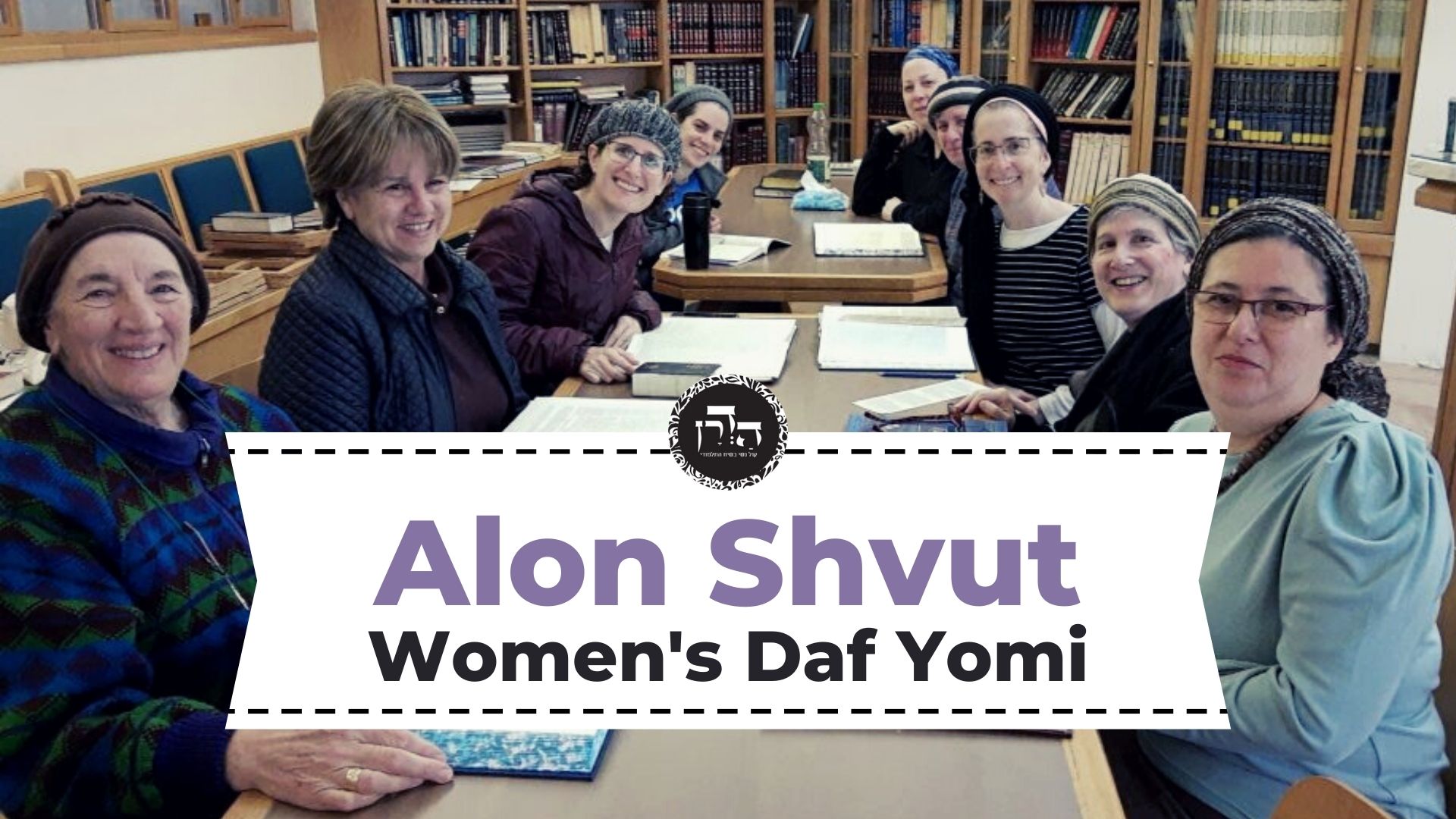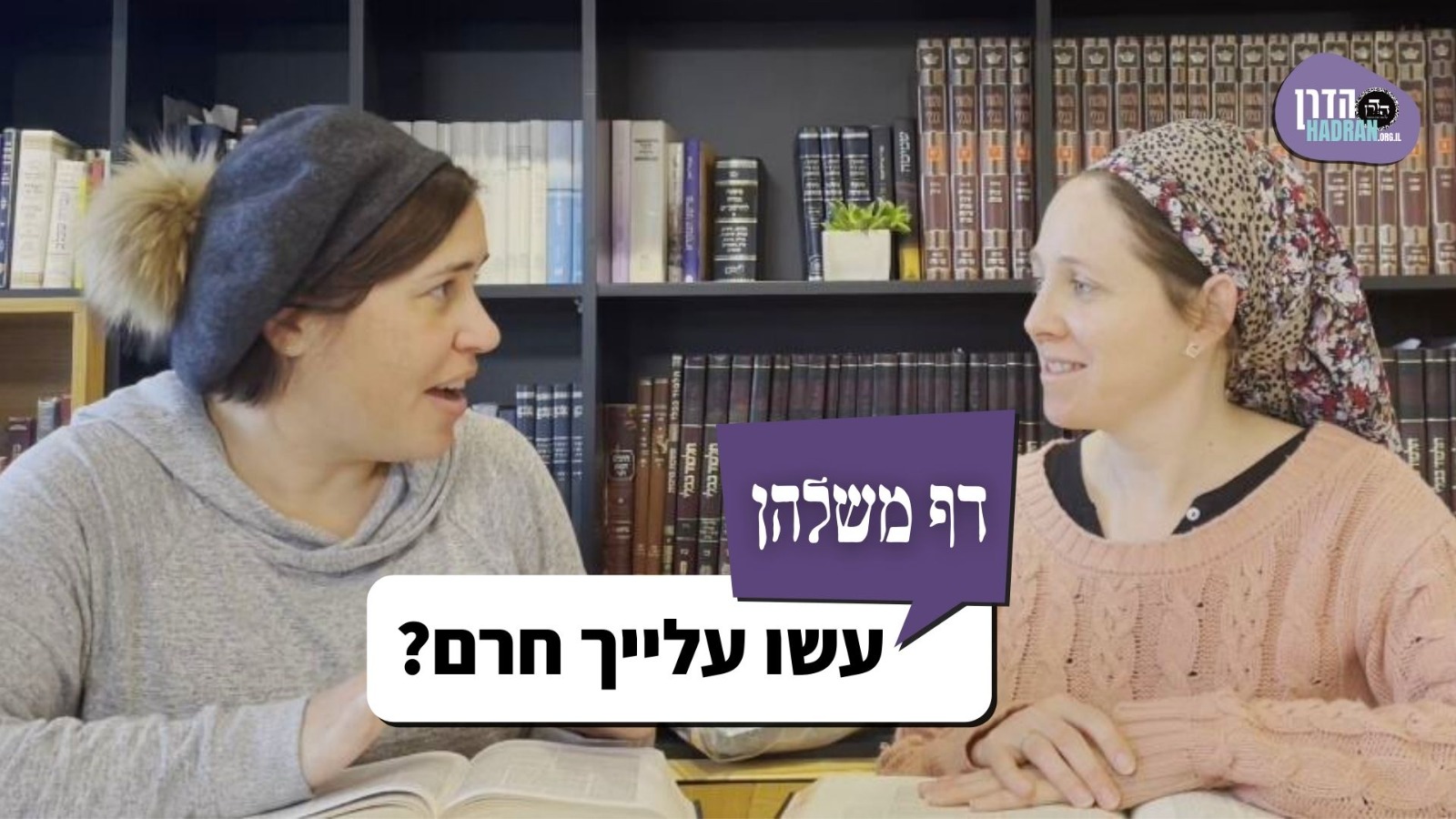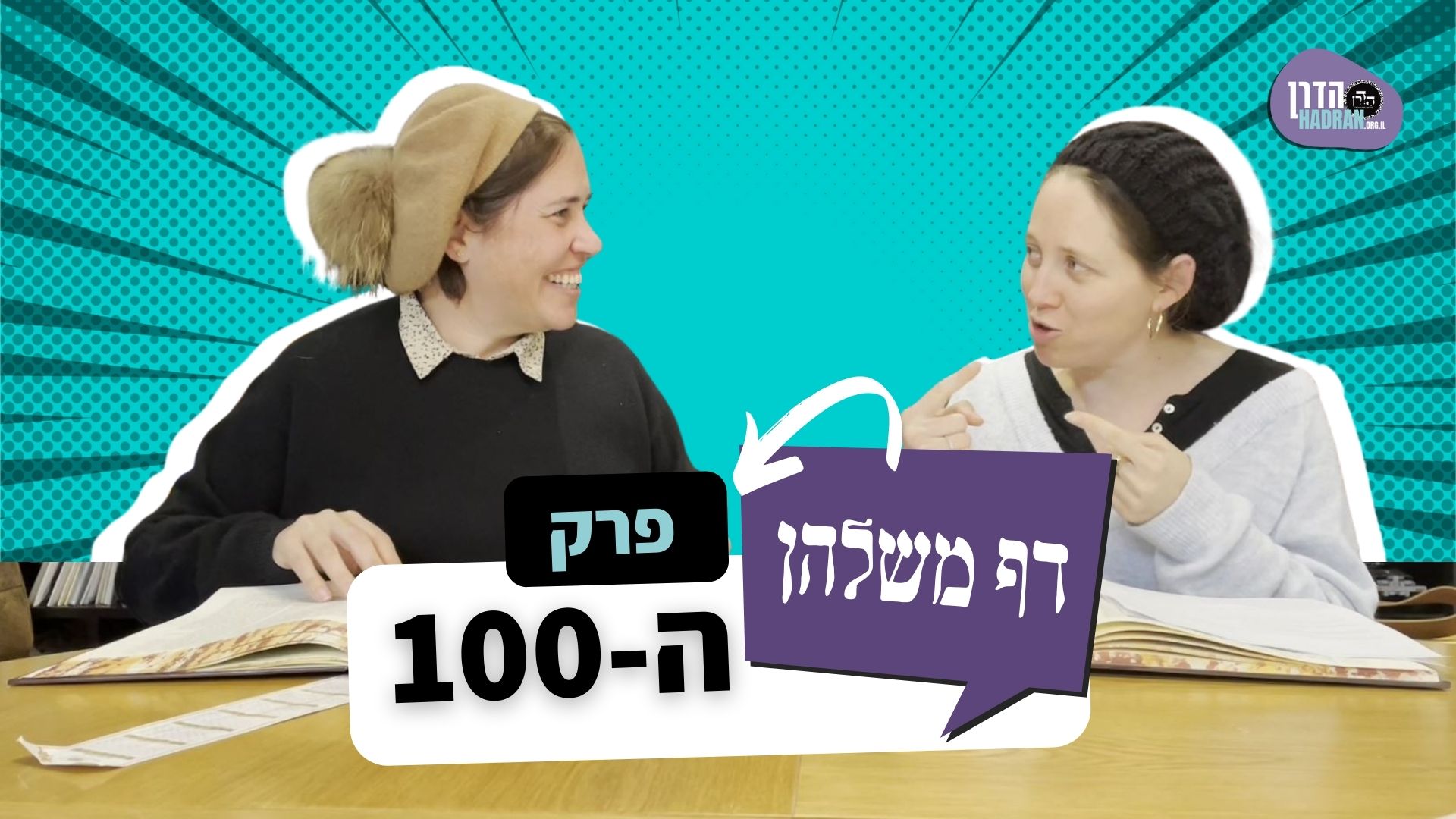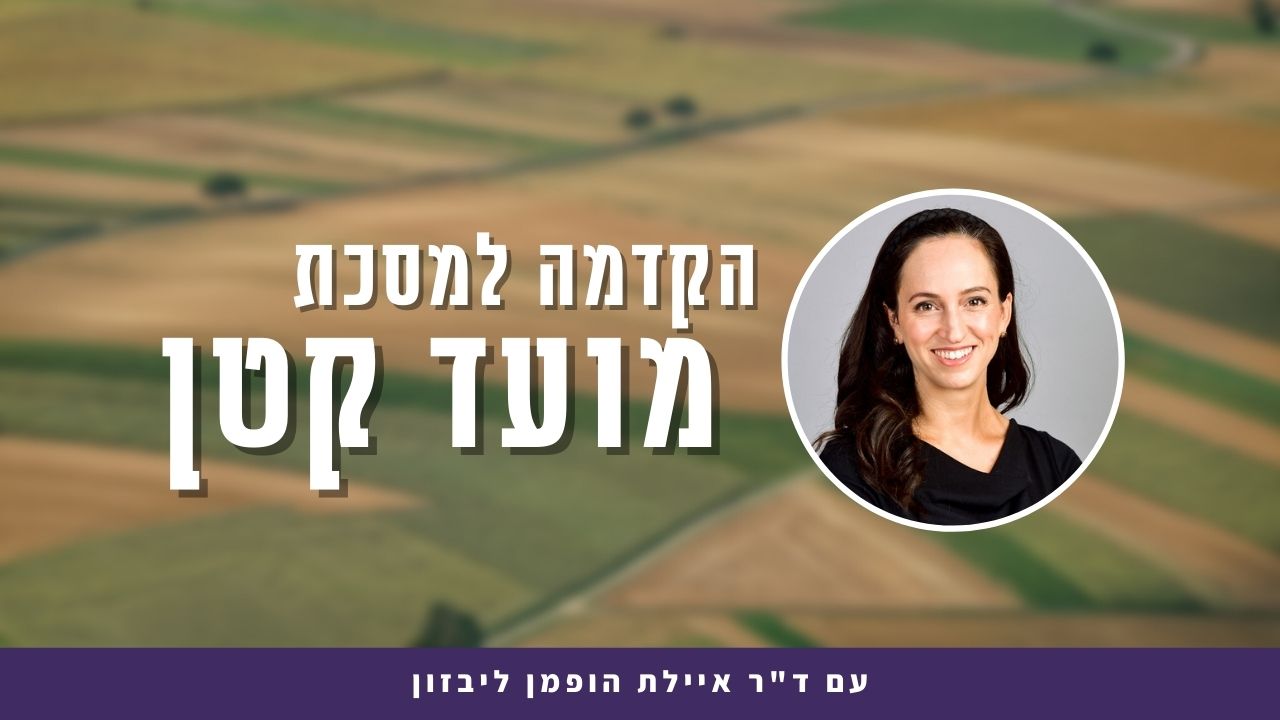מועד קטן יח
הֲלָכָה כְּרַבִּי יוֹסֵי בַּמּוֹעֵד וּבְאֵבֶל, דְּאָמַר שְׁמוּאֵל: הֲלָכָה כְּדִבְרֵי הַמֵּיקֵל בְּאֵבֶל.
The halakha is in accordance with the opinion of Rabbi Yosei with regard to the intermediate days of the Festival and with regard to mourning, as Shmuel said this general principle: The halakha is in accordance with the statement of the more lenient authority in matters relating to mourning.
פִּנְחָס אֲחוּהּ דְּמָר שְׁמוּאֵל אִיתְּרַע בֵּיהּ מִילְּתָא, עָל שְׁמוּאֵל לְמִישְׁאַל טַעְמָא מִינֵּיהּ. חֲזַנְהוּ לְטוּפְרֵי[הּ] דַּהֲווֹ נְפִישָׁן, אֲמַר לֵיהּ: אַמַּאי לָא שָׁקְלַתְּ לְהוּ? אֲמַר לֵיהּ: אִי בְּדִידֵיהּ הֲוָה, מִי מְזַלְזְלַתְּ בֵּיהּ כּוּלֵּי הַאי?
It was related that something unpleasant happened to Pineḥas, brother of Mar Shmuel, that is to say, one of his close relatives died. Shmuel entered to ask him the reason, i.e., to console him. He saw that Pineḥas’s nails were long, and said to him: Why do you not cut them? Pineḥas replied: If it were your relative who died, and you were in mourning, would you treat the matter so lightly and cut your nails?
הֲוַאי ״כִּשְׁגָגָה שֶׁיֹּצָא מִלִּפְנֵי הַשַּׁלִּיט״, וְאִיתְּרַע בֵּיהּ מִילְּתָא בִּשְׁמוּאֵל. עָל פִּנְחָס אֲחוּהּ לְמִישְׁאַל טַעְמָא מִינֵּיהּ. שַׁקְלִינְהוּ לְטוּפְרֵיהּ חַבְטִינְהוּ לְאַפֵּיהּ. אֲמַר לֵיהּ: לֵית לָךָ בְּרִית כְּרוּתָה לַשְּׂפָתַיִם?
Pineḥas’s words were: “Like an error that proceeds from a ruler” (Ecclesiastes 10:5). As soon as he uttered them they come true, even though he did not intend them. Shortly after Pineḥas made his comment, something unpleasant happened to Shmuel, and one of his close relatives died. Pineḥas, his brother, entered to ask him the reason, i.e., to offer words of comfort. Shmuel took his nails and cast them in Pineḥas’s face. Shmuel then said to him: Do you not know the principle that a covenant is made with the lips? In other words, do you not know that what one says influences future events?
דְּאָמַר רַבִּי יוֹחָנָן: מִנַּיִן שֶׁבְּרִית כְּרוּתָה לַשְּׂפָתַיִם — שֶׁנֶּאֱמַר: ״וַיֹּאמֶר אַבְרָהָם אֶל נְעָרָיו שְׁבוּ לָכֶם פֹּה עִם הַחֲמוֹר וַאֲנִי וְהַנַּעַר נֵלְכָה עַד כֹּה וְנִשְׁתַּחֲוֶה וְנָשׁוּבָה אֲלֵיכֶם״, וְאִיסְתַּיְּיעָא מִלְּתָא דַּהֲדוּר תַּרְוַיְיהוּ.
This is as Rabbi Yoḥanan said: From where is it derived that a covenant is made with the lips, and that one’s speech has the power to change events? For it is stated: “And Abraham said to his young men: Stay here with the donkey, and I and the lad will go onward; and we will worship, and we will come back to you” (Genesis 22:5). Abraham said this even though he thought that he was going to sacrifice his son as an offering and that Isaac would not be returning, yet this had an influence and they both came back.
סְבוּר מִינֵּיהּ דְּיָד — אִין, דְּרֶגֶל — לָא. אָמַר רַב עָנָן בַּר תַּחְלִיפָא: לְדִידִי מִפָּרְשָׁא לִי מִינֵּיהּ דִּשְׁמוּאֵל: לָא שְׁנָא דְּיָד וְלָא שְׁנָא דְּרֶגֶל.
With regard to this halakha pertaining to a mourner cutting his nails: They initially concluded from this: With regard to the nails on his hand, yes, a mourner may cut them; but as for the nails on his foot, no, he may not cut them, because long toenails are less repulsive. Rav Anan bar Taḥlifa said: It was explained to me by Shmuel himself: It is not different if it is the nails on the hand and it is not different if it is the nails on the foot, as in both cases cutting the nails is permitted.
אָמַר רַב חִיָּיא בַּר אָשֵׁי אָמַר רַב: וּבִגְנוּסְטְרָא — אָסוּר. אָמַר רַב שֶׁמֶן בַּר אַבָּא: הֲוָה קָאֵימְנָא קַמֵּיהּ דְּרַבִּי יוֹחָנָן בֵּי מִדְרְשָׁא בְּחוּלּוֹ שֶׁל מוֹעֵד, וְשַׁקְלִינְהוּ לְטוּפְרֵיהּ בְּשִׁינֵּיהּ וְזַרְקִינְהוּ.
Rav Ḥiyya bar Ashi said that Rav said: But with scissors [genustera] specifically for nail cutting it is prohibited, i.e., the mourner should cut his nails in an alternate manner. Rav Shemen bar Abba said: I once stood before Rabbi Yoḥanan in the study hall during the intermediate days of a Festival, and he cut his nails with his teeth and threw them down.
שְׁמַע מִינַּהּ תְּלָת. שְׁמַע מִינַּהּ: מוּתָּר לִיטּוֹל צִפׇּרְנַיִם בְּחוּלּוֹ שֶׁל מוֹעֵד, וּשְׁמַע מִינַּהּ: אֵין בָּהֶן מִשּׁוּם מִיאוּס, וּשְׁמַע מִינַּהּ: מוּתָּר לְזוֹרְקָן.
The Gemara comments: Learn from this incident of Rabbi Yoḥanan three halakhot: Learn from this that it is permitted to cut one’s nails on the intermediate days of a Festival. And learn from this that nails have no prohibition due to the fact that they are repulsive, i.e., there is no prohibition against biting them on that basis. Inasmuch as one is prohibited from placing something repulsive in his mouth, this incident teaches that nails do not fall into this category. And also learn from this that it is permitted to throw nails away.
אִינִי? וְהָתַנְיָא, שְׁלֹשָׁה דְּבָרִים נֶאֶמְרוּ בַּצִּפׇּרְנַיִם: הַקּוֹבְרָן — צַדִּיק, שׂוֹרְפָן — חָסִיד, זוֹרְקָן — רָשָׁע. טַעְמָא מַאי — שֶׁמָּא תַּעֲבוֹר עֲלֵיהֶן אִשָּׁה עוּבָּרָהּ וְתַפִּיל.
The Gemara asks: Is that so? But isn’t it taught in a baraita: Three things were said about nails: One who buries them in the ground is deemed righteous. One who burns them is even better, as he is considered pious. One who merely throws them away is regarded as wicked. The Gemara explains: What is the reason that it is prohibited to throw away nail clippings? This is prohibited lest a pregnant women pass over them and miscarry, for the Sages had a tradition that it is dangerous for a pregnant woman to walk over fingernails.
אִשָּׁה בֵּי מִדְרְשָׁא לָא שְׁכִיחָא. וְכִי תֵּימָא: זִימְנִין דִּמְיכַנְּשִׁי לְהוּ וְשָׁדֵי לְהוּ אַבָּרַאי — כֵּיוָן דְּאִשְׁתַּנִּי אִשְׁתַּנִּי.
The Gemara answers: A woman is not usually found in the study hall, and therefore Rabbi Yoḥanan was not concerned about throwing his nail clippings there. If you say that sometimes the nails are gathered together when the floor is swept and then thrown outside where a pregnant woman may walk over them, this is not a problem. Once their place has changed the nails themselves change and are no longer harmful.
אָמַר רַב יְהוּדָה אָמַר רַב: זוּג בָּא מֵחַמָּתָן לִפְנֵי רַבִּי, וּמָר זוּטְרָא מַתְנֵי: זוּג בָּא מֵחַמָּתָן לִפְנֵי רַבִּי, וּבִקְּשׁוּ מִמֶּנּוּ צִפׇּרְנַיִם — וְהִתִּיר לָהֶם. וְאִם בִּקְּשׁוּ מִמֶּנּוּ שָׂפָה — הִתִּיר לָהֶם, וּשְׁמוּאֵל אָמַר: אַף בִּקְּשׁוּ מִמֶּנּוּ שָׂפָה, וְהִתִּיר לָהֶם.
Rav Yehuda said that Rav said: A pair of Sages from Ḥamatan came before Rabbi Yehuda HaNasi. And Mar Zutra taught it without the names of Rav Yehuda and Rav, simply as: A pair of Sages from Ḥamatan came before Rabbi Yehuda HaNasi. And they asked him whether or not a mourner is permitted to cut his nails, and he permitted it to them. And had they asked him whether or not a mourner may trim his mustache, he would also have permitted it to them. And Shmuel said: They also asked him about trimming a mustache, and he permitted it to them.
אָמַר אֲבִיטוּל סָפְרָא מִשְּׁמֵיהּ דְּרַב פָּפָּא: שָׂפָה מִזָּוִית לְזָוִית. אָמַר רַבִּי אַמֵּי: וּבְשָׂפָה הַמְעַכֶּבֶת. אָמַר רַב נַחְמָן בַּר יִצְחָק: לְדִידִי כְּשָׂפָה הַמְעַכֶּבֶת דָּמֵי לִי.
Avitul the scribe said in the name of Rav Pappa: A mustache may be trimmed from one corner to the other corner of the mouth. Rabbi Ami said: One may trim only the portion of the mustache that interferes with normal eating, but one may not trim the mustache for beautification. Rav Naḥman bar Yitzḥak said: For me, my entire mustache is considered like a mustache that interferes with normal eating, as I am particularly sensitive, and so I may trim my entire mustache.
וַאֲמַר אֲבִיטוּל סָפְרָא מִשְּׁמֵיהּ דְּרַב פָּפָּא: פַּרְעֹה שֶׁהָיָה בִּימֵי מֹשֶׁה, הוּא אַמָּה, וּזְקָנוֹ אַמָּה, וּפַרְמַשְׁתְּקוֹ אַמָּה וָזֶרֶת, לְקַיֵּים מַה שֶּׁנֶּאֱמַר: ״וּשְׁפַל אֲנָשִׁים יָקִים עָלֶיהָ״.
§ Having mentioned Avitul the scribe, the Gemara records other statements of his: And Avitul the scribe said in the name of Rav Pappa: The Pharaoh who lived in the days of Moses was a cubit tall, his beard was a cubit long, and his penis [parmashtako] was a cubit and a span, i.e., a cubit and the distance between the thumb and the little finger, in length, in order to fulfill what is stated: “And He sets up over it the lowest of men” (Daniel 4:14), which teaches that Pharaoh was extremely short and lowly.
וַאֲמַר אֲבִיטוּל סָפְרָא מִשְּׁמֵיהּ דְּרַב פָּפָּא: פַּרְעֹה שֶׁהָיָה בִּימֵי מֹשֶׁה אַמְגּוּשִׁי הָיָה, שֶׁנֶּאֱמַר: ״הִנֵּה יוֹצֵא הַמָּיְמָה וְגוֹ׳״.
Avitul the scribe also said in the name of Rav Pappa: The Pharaoh who lived in the days of Moses was a sorcerer [amgushi], as it is stated: “Behold, he goes out to the water” (Exodus 7:15). Pharaoh would regularly go out to the water in order to engage in witchcraft.
וְאֵלּוּ מְכַבְּסִין בַּמּוֹעֵד, הַבָּא מִמְּדִינַת הַיָּם. אָמַר רַב אַסִּי אָמַר רַבִּי יוֹחָנָן: מִי שֶׁאֵין לוֹ אֶלָּא חָלוּק אֶחָד — מוּתָּר לְכַבְּסוֹ בְּחוּלּוֹ שֶׁל מוֹעֵד.
§ The mishna taught: And these people may launder their clothes on the intermediate days of a Festival: One who comes from a country overseas. Rav Asi said that Rabbi Yoḥanan said: Anyone who has only one shirt is permitted to launder it on the intermediate days of a Festival.
מֵתִיב רַבִּי יִרְמְיָה: אֵלּוּ מְכַבְּסִין בַּמּוֹעֵד, הַבָּא מִמְּדִינַת הַיָּם כּוּ׳. הָנֵי אִין, מִי שֶׁאֵין לוֹ אֶלָּא חָלוּק אֶחָד — לָא!
Rabbi Yirmeya raised an objection from what was taught in the mishna: And these people may launder their clothes on the intermediate days of a Festival: One who comes from a country overseas, and one who is released from a house of captivity, and one who comes out of prison, and one who had been ostracized and the Rabbis released him from his decree of ostracism, etc. It may be inferred: Those who are mentioned in the mishna, yes, they may launder their clothes during the intermediate days of the Festival, but one who has only one shirt may not launder it.
אֲמַר לֵיהּ רַבִּי יַעֲקֹב לְרַבִּי יִרְמְיָה: אַסְבְּרַהּ לָךְ, מַתְנִיתִין אַף עַל גַּב דְּאִית לֵיהּ תְּרֵי וּמִטַּנְּפִי.
Rabbi Ya’akov said to Rabbi Yirmeya: I will explain it to you. The mishna is referring to those cases where one is permitted to launder his clothes even if he has two changes of garments and they are dirty. Rabbi Yoḥanan speaks about one who has only one garment, and he rules that he may launder it in all circumstances.
שְׁלַח רַב יִצְחָק בַּר יַעֲקֹב בַּר גִּיּוֹרֵי מִשְּׁמֵיהּ דְּרַבִּי יוֹחָנָן: כְּלֵי פִשְׁתָּן — מוּתָּר לְכַבְּסָן בְּחוּלּוֹ שֶׁל מוֹעֵד. מֵתִיב רָבָא: מִטְפְּחוֹת הַיָּדַיִם, מִטְפְּחוֹת
Rav Yitzḥak bar Ya’akov bar Giyorei sent a message in the name of Rabbi Yoḥanan: With regard to linen garments, it is permitted to launder them during the intermediate days of the Festival because they are easily soiled. Rava raised an objection from what is taught in the mishna: Hand towels, the towels
הַסְּפָרִים. הָנֵי — אִין, כְּלֵי פִשְׁתָּן — לָא.
of barbers that are used to cover a person having a haircut, and body-drying towels may all be laundered on the intermediate days of a Festival. This statement implies that these garments, yes, they may be laundered, but other types of linen garments, no, they may not be laundered.
אֲמַר לֵיהּ אַבָּיֵי: מַתְנִיתִין אֲפִילּוּ דִּשְׁאָר מִינֵי. אָמַר בַּר הִידְיָא: לְדִידִי חֲזֵי לִי יַמָּהּ שֶׁל טְבֶרְיָה, דְּמַפְּקִי לַהּ מְשִׁיכְלֵי דְּמָנֵי כִּיתָּנָא בְּחוּלָּא דְמוֹעֲדָא.
Abaye said to him: This is not a contradiction: The mishna is referring to garments made even of other types of materials; linen garments, however, may be laundered even when they serve other purposes. Bar Hedya said: I myself saw the Sea of Tiberias, the Sea of Galilee, to which basins full of linen garments were brought out to be laundered during the intermediate days of a Festival.
מַתְקֵיף לַהּ אַבָּיֵי: מַאן לֵימָא לַן דִּבְרָצוֹן חֲכָמִים עָבְדִי, דִּלְמָא שֶׁלֹּא בִּרְצוֹן חֲכָמִים עָבְדִי.
Abaye strongly objects to this: This report cannot be adduced as proof for the halakha, for who says to us that they did this in accordance with the will of the Sages? Perhaps they did it without the will of the Sages.
מַתְנִי׳ וְאֵלּוּ כּוֹתְבִין בַּמּוֹעֵד: קִדּוּשֵׁי נָשִׁים וְגִיטִּין וְשׁוֹבָרִין. דְּיָיתֵיקֵי, מַתָּנָה וּפְרוֹזְבּוּלִין. אִיגְּרוֹת שׁוּם וְאִיגְּרוֹת מָזוֹן.
MISHNA: And these are the documents that may be written on the intermediate days of a Festival: Documents of betrothal of wives, through which bridegrooms betroth their brides; bills of divorce; receipts for the repayment of debts; wills [deyateiki]; deeds of gift; perozbolin, documents through which lenders authorize the courts to collect their loans on their behalf, thereby preventing the Sabbatical year from canceling their debts; letters of valuation, which were drawn up by the court when they valuated property and transferred it to the lender; and letters of sustenance, which were drawn up when one accepted upon himself to maintain another, e.g., his step-daughter.
שְׁטָרֵי חֲלִיצָה וּמֵיאוּנִים וּשְׁטָרֵי בֵירוּרִין. גְּזֵרוֹת בֵּית דִּין וְאִיגְּרוֹת שֶׁל רְשׁוּת.
The list continues: Documents of the ritual through which the brother-in-law frees the yevama of her levirate bonds [ḥalitza], thereby freeing her from the obligation to marry one of her deceased husband’s brothers; documents in which the court records the refusal of a girl upon reaching majority to remain married to the man to whom her mother or brothers married her as a minor after the death of her father; documents of arbitration, in which the court summarizes a conflict that had been resolved through arbitration; court rulings; and the official correspondence of the ruling authorities.
גְּמָ׳ אָמַר שְׁמוּאֵל: מוּתָּר לְאָרֵס אִשָּׁה בְּחוּלּוֹ שֶׁל מוֹעֵד, שֶׁמָּא יִקְדְּמֶנּוּ אַחֵר. לֵימָא מְסַיַּיע לֵיהּ: וְאֵלּוּ כּוֹתְבִין בַּמּוֹעֵד — קִדּוּשֵׁי נָשִׁים,
GEMARA: Shmuel said: It is permitted to betroth a woman on the intermediate days of a Festival, lest another come and betroth her first. The Gemara asks: Let us say that the mishna supports Shmuel, who said: And these are the documents that may be drawn up on the intermediate days of a Festival: Documents of betrothal.
מַאי לָאו שְׁטָרֵי קִדּוּשִׁין מַמָּשׁ? לָא, שְׁטָרֵי פְסִיקָתָא, וְכִדְרַב גִּידֵּל אָמַר רַב.
What, is the mishna not referring to actual documents of betrothal, through which one would actually betroth a woman? The Gemara rejects this: No, the mishna is referring to documents of stipulation recording the amounts that the parents agree to pay as the dowry of their respective son or daughter, in accordance with what Rav Giddel said that Rav said.
דְּאָמַר רַב גִּידֵּל אָמַר רַב: כַּמָּה אַתָּה נוֹתֵן לְבִנְךָ? כָּךְ וְכָךְ. כַּמָּה אַתָּה נוֹתֵן לְבִתְּךָ? כָּךְ וְכָךְ. עָמְדוּ וְקִדְּשׁוּ קָנוּ, הֵן הֵן הַדְּבָרִים הַנִּקְנִין בַּאֲמִירָה.
For Rav Giddel said that Rav said: When two families negotiate the terms of marriage for their respective children, and one side says to the other: How much do you give to your son as a dowry? And the second side says: I give such and such amount; how much do you give to your daughter? And the first side responds: Such and such amount, then, once the bride and groom arose and pronounced the betrothal formula, then all of these obligations are acquired and therefore binding. These are among the things that are acquired through words alone. In other words, there is no need to perform an additional act of acquisition in order to confirm the agreement, and the mishna is referring to a document recording such an agreement. Although such a document may be drawn up even on the intermediate days of a Festival, this does not mean that one may actually betroth a woman during this period.
לֵימָא מְסַיַּיע לֵיהּ: אֵין נוֹשְׂאִין נָשִׁים בַּמּוֹעֵד, לֹא בְּתוּלוֹת וְלֹא אַלְמָנוֹת. וְלֹא מְיַבְּמִין, מִפְּנֵי שֶׁשִּׂמְחָה הִיא לוֹ. הָא לְאָרֵס — שָׁרֵי.
The Gemara asks: Let us say that the following mishna supports Shmuel: One may not marry a woman on the intermediate days of a Festival, neither a virgin nor a widow; nor may one then perform levirate marriage with his sister-in-law, if his brother died childless, because that would be a joyous occasion for him. This statement implies that it is only marrying that is prohibited, but betrothing is permitted.
לָא מִיבַּעְיָא קָאָמַר. לָא מִיבַּעְיָא לְאָרֵס — דְּלָא קָעָבֵיד מִצְוָה, אֶלָּא אֲפִילּוּ לִישָּׂא נָמֵי, דְּקָא עָבֵיד מִצְוָה, אָסוּר.
The Gemara rejects this argument: This is not the correct way to understand the mishna, as it is speaking in the style of: Needless to say. It is needless to say that betrothal is not permitted, because the groom does not perform a mitzva through betrothal. Rather, the same is true even of marriage, through which one performs a mitzva, as marriage is preparation for fulfilling the mitzva of procreation. It is still not permitted.
תָּא שְׁמַע, דְּתָנָא דְּבֵי שְׁמוּאֵל: מְאָרְסִין, אֲבָל לֹא כּוֹנְסִין. וְאֵין עוֹשִׂין סְעוּדַת אֵירוּסִין, וְלֹא מְיַבְּמִין, מִפְּנֵי שֶׁשִּׂמְחָה הִיא לוֹ. שְׁמַע מִינַּהּ.
The Gemara offers another support for Shmuel: Come and hear that which a Sage of the school of Shmuel taught in the following baraita: One may betroth a woman on the intermediate days of a Festival, but he may not marry her, nor may he make a betrothal feast, nor may he perform levirate marriage, because that would be a joyous occasion for him, and one may not mix the joy of a wedding with the joy of the Festival. The Gemara concludes: Learn from this a support for Shmuel’s opinion.
וּמִי אָמַר שְׁמוּאֵל שֶׁמָּא יִקְדְּמֶנּוּ אַחֵר? וְהָאָמַר רַב יְהוּדָה אָמַר שְׁמוּאֵל: בְּכׇל יוֹם וְיוֹם בַּת קוֹל יוֹצֵאת וְאוֹמֶרֶת: בַּת פְּלוֹנִי לִפְלוֹנִי, שְׂדֵה פְלוֹנִי לִפְלוֹנִי.
The Gemara raises a question about the ruling itself: And did Shmuel actually say that we are concerned that perhaps another man will come and betroth the woman first? But didn’t Rav Yehuda say that Shmuel said: Every day a Divine Voice issues forth and says: The daughter of so-and-so is destined to be the wife of so-and-so; the field of so-and-so will belong to so-and-so? If this is the case, why should one be concerned lest another betroth her first? It is predestined that he will marry his designated mate.
אֶלָּא: שֶׁמָּא יִקְדְּמֶנּוּ אַחֵר בְּרַחֲמִים.
Rather, Shmuel’s statement should be understood as follows: Perhaps another man will come and betroth her first by means of praying for divine mercy. In other words, Shmuel is concerned that the rival may beseech God to cancel the decree of the Divine Voice, and therefore the first man needs to hurry and betroth the woman before the other one has a chance to pray that he should take her from him.
כִּי הָא דְּרָבָא שַׁמְעֵיהּ לְהָהוּא גַּבְרָא דְּבָעֵי רַחֲמֵי וְאָמַר: תִּזְדְּמֵן לִי פְּלָנִיתָא. אֲמַר לֵיהּ: לָא תִּיבְעֵי רַחֲמֵי הָכִי. אִי חַזְיָא לָךְ — לָא אָזְלָא מִינָּךְ, וְאִי לָא — כָּפְרַתְּ בַּה׳. בָּתַר הָכִי, שַׁמְעֵיהּ דְּקָאָמַר: אוֹ אִיהוּ לֵימוּת מִקַּמַּהּ, אוֹ אִיהִי תְּמוּת מִקַּמֵּיהּ. אֲמַר לֵיהּ: לָאו אָמֵינָא לָךְ לָא תִּיבְעֵי עֲלַהּ דְּמִילְּתָא?
This is like this incident, in which Rava heard a certain man asking for mercy, i.e., praying, who said: Grant me so-and-so as a wife. Rava said to him: Do not pray and ask for mercy in this way. If she is fit for you, and it has been decreed that she will be your wife, she will not go away from you. And if she is not destined to be your wife, you will come to deny the Lord when you see that your prayer is not answered. After the man married this woman, Rava heard him say in prayer: Please either let him die before her or let her die before him. He was speaking about himself and his wife because he had grown to hate her so much. Rava said to him: Did I not say to you not to pray for this matter?
הָכִי אָמַר רַב מִשּׁוּם רַבִּי רְאוּבֵן בֶּן אִצְטְרוֹבִילִי: מִן הַתּוֹרָה וּמִן הַנְּבִיאִים וּמִן הַכְּתוּבִים — מֵה׳ אִשָּׁה לְאִישׁ. מִן הַתּוֹרָה, דִּכְתִיב: ״וַיַּעַן לָבָן וּבְתוּאֵל וַיֹּאמְרוּ מֵה׳ יָצָא הַדָּבָר״. מִן הַנְּבִיאִים, דִּכְתִיב: ״וְאָבִיו וְאִמּוֹ לֹא יָדְעוּ כִּי מֵה׳ הִיא״. מִן הַכְּתוּבִים, דִּכְתִיב: ״בַּיִת וָהוֹן נַחֲלַת אָבוֹת וּמֵה׳ אִשָּׁה מַשְׂכָּלֶת״.
Rav said in the name of Rabbi Reuven ben Itzterobili as follows: From the Torah, and from the Prophets, and from the Writings; it implies that the decree that a specific woman is destined to be married to a specific man is from God. From where is this derived? It is from the Torah, as it is written: “Then Laban and Bethuel answered and said: The thing comes from the Lord, we cannot speak to you either bad or good” (Genesis 24:50). From the Prophets, as it is written: “But his father and his mother knew not that it was of the Lord” (Judges 14:4). From the Writings, as it is written: “House and riches are the inheritance of fathers; but a prudent woman is from the Lord” (Proverbs 19:14).
וְאָמַר רַב מִשּׁוּם רַבִּי רְאוּבֵן בֶּן אִצְטְרוֹבִילִי, וְאָמְרִי לַהּ בְּמַתְנִיתָא תָּנָא, אָמַר רַבִּי רְאוּבֵן בֶּן אִצְטְרוֹבִילִי: אֵין אָדָם נֶחְשָׁד בְּדָבָר אֶלָּא אִם כֵּן עֲשָׂאוֹ, וְאִם לֹא עָשָׂה כּוּלּוֹ — עָשָׂה מִקְצָתוֹ, וְאִם לֹא עָשָׂה מִקְצָתוֹ — הִרְהֵר בְּלִבּוֹ לַעֲשׂוֹתוֹ, וְאִם לֹא הִרְהֵר בְּלִבּוֹ לַעֲשׂוֹתוֹ — רָאָה אֲחֵרִים שֶׁעָשׂוּ וְשָׂמַח.
§ Apropos a teaching of Rabbi Reuven ben Itzterobili, the Gemara states that Rav said in the name of Rabbi Reuven ben Itzterobili, and some say that it was taught in a baraita that Rabbi Reuven ben Itzterobili said: A man is suspected of having done something wrong only if he has indeed done so. And if he did not do it wholly, then probably he did it partly. And if he did not do it even partly, then probably he thought in his heart to do it. And if he did not even think to himself to do it, then certainly he saw others doing it and was happy. Suspicions do not arbitrarily arise about a person; therefore there is certainly some basis for them.
מֵתִיב רַבִּי יַעֲקֹב: ״וַיְחַפְּאוּ בְנֵי יִשְׂרָאֵל דְּבָרִים אֲשֶׁר לֹא כֵן עַל ה׳ אֱלֹהֵיהֶם״! הָתָם לְהַכְעִיס הוּא דַּעֲבוּד.
Rabbi Ya’akov raised an objection: Does the verse not say: “And the children of Israel fabricated matters that were not right against the Lord their God” (II Kings 17:9), which indicates that it is possible to make up stories about someone else even though they are entirely baseless. The Gemara answers: There they did it in order to anger God, but they did not actually think that what they were saying was true.
תָּא שְׁמַע: ״וַיְקַנְאוּ לְמֹשֶׁה בַּמַּחֲנֶה לְאַהֲרֹן קְדוֹשׁ ה׳״, רַב שְׁמוּאֵל בַּר יִצְחָק אָמַר: מְלַמֵּד שֶׁכׇּל אֶחָד קִינֵּא לְאִשְׁתּוֹ מִמֹּשֶׁה! הָתָם מִשּׁוּם שִׂנְאָה הוּא דַּעֲבוּד.
Come and hear a challenge from a different source: The verse states: “And they were jealous of Moses in the camp, of Aaron the Lord’s holy one” (Psalms 106:16). Rav Shmuel bar Yitzḥak said: This verse teaches that every man warned his wife against seclusion with Moses because he was jealous. This implies that every man thought that his wife had secluded herself with Moses and sinned, although this was certainly not the case. This demonstrates that it is possible to suspect an absolutely innocent person. The Gemara answers: There they did it out of hatred for Moses. They did not actually suspect him of wrongdoing. Instead, their goal was to degrade him by leveling these false accusations against him.
תָּא שְׁמַע, אָמַר רַבִּי יוֹסֵי: יְהֵא חֶלְקִי עִם מִי שֶׁחוֹשְׁדִין אוֹתוֹ בְּדָבָר וְאֵין בּוֹ. וְאָמַר רַב פָּפָּא: לְדִידִי חַשְׁדוּן וְלָא הֲוָה בִּי!
The Gemara raises another challenge, based on yet another source: Come and hear that which Rabbi Yosei said: May my portion in the future world be with one who is suspected of a certain wrongdoing but is innocent, as the pain that such a person experiences atones for his sins. This statement also appears to imply that it is possible to suspect an absolutely innocent person. And Rav Pappa said: They suspected me of a certain wrongdoing but I was not guilty.
לָא קַשְׁיָא: הָא בְּקָלָא דְּפָסֵיק, הָא בְּקָלָא דְלָא פָּסֵיק. וְקָלָא דְלָא פָּסֵיק עַד כַּמָּה? אָמַר אַבָּיֵי, אֲמַרָה לִי אֵם: דּוֹמֵי דְמָתָא יוֹמָא וּפַלְגָא.
The Gemara answers: It is not difficult. This is referring to a rumor that stops, and therefore it is possible that it is groundless, whereas that is referring to a rumor that does not stop, and in that case there must be a factual basis for the suspicion. The Gemara asks: To be considered a rumor that does not stop, for how long must it persist? Abaye said: My nurse told me: Local gossip lasts for a day and a half, and then it is deemed to be a rumor that does not stop.
וְהָנֵי מִילֵּי דְּלָא פְּסַק בֵּינֵי בֵּינֵי, אֲבָל פְּסַק בֵּינֵי בֵּינֵי — לֵית לַן בַּהּ. וְכִי פְּסַק בֵּינֵי בֵּינֵי, לָא אֲמַרַן אֶלָּא דְּלָא פְּסַק מֵחֲמַת יִרְאָה, אֲבָל פְּסַק מֵחֲמַת יִרְאָה — לָא.
The Gemara comments: This applies only if the rumor did not stop in between, during the day and a half, but if it stopped in between then we have no problem with it, and it is not a persistent rumor. And if the rumor stopped in between, we said that it is considered baseless only if it stopped of its own accord and not out of fear, i.e., because the suspect is violent and therefore people are afraid to speak badly about him. But if the rumor stopped out of fear, then this dispensation does not apply, and it is still assumed that there must be some basis to the rumor.
וְלָא אֲמַרַן, אֶלָּא דְּלָא הָדַר נָבֵט, אֲבָל הָדַר נָבֵט — לָא. וְלָא אֲמַרַן אֶלָּא דְּלֵית לֵיהּ אוֹיְבִים, אֲבָל אִית לֵיהּ אוֹיְבִים — אוֹיְבִים הוּא דְּאַפְּקוּהּ לְקָלָא.
And we said that a rumor that stopped is assumed to be baseless only if it did not arise again. But if it arose again, then this does not apply. And we said that a rumor that does not stop must be taken seriously only if the slandered person has no enemies. But if he has known enemies, then it can be assumed that it was the enemies who disseminated the rumor.
מַתְנִי׳ אֵין כּוֹתְבִין שְׁטָרֵי חוֹב בַּמּוֹעֵד. וְאִם אֵינוֹ מַאֲמִינוֹ, אוֹ שֶׁאֵין לוֹ מַה יֹּאכַל — הֲרֵי זֶה יִכְתּוֹב.
MISHNA: One may not write bills of debt on the intermediate days of a Festival. But if the lender does not trust the borrower, and he is concerned that the borrower will later deny the loan, or if the scribe has nothing to eat, then he may write a bill of debt during the Festival week.
אֵין כּוֹתְבִין סְפָרִים תְּפִילִּין וּמְזוּזוֹת בַּמּוֹעֵד, וְאֵין מַגִּיהִין אוֹת אַחַת אֲפִילּוּ בְּסֵפֶר עֶזְרָא. רַבִּי יְהוּדָה אוֹמֵר: כּוֹתֵב אָדָם תְּפִילִּין וּמְזוּזוֹת לְעַצְמוֹ,
One may not write Torah scrolls, phylacteries, or mezuzot on the intermediate days of a Festival, nor may one correct a single letter, even in the Torah scroll of Ezra, which was kept in the Temple and upon which all the Jewish communities relied. Rabbi Yehuda says: One may write phylacteries and mezuzot for himself on the intermediate days of a Festival if he needs them.

